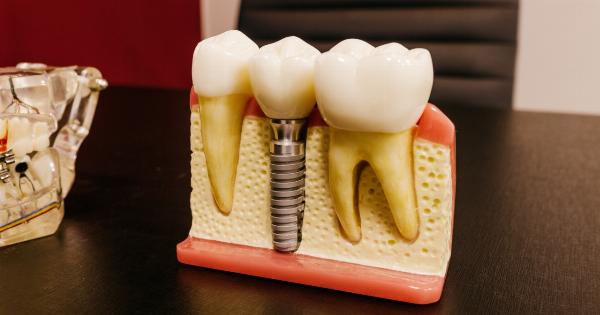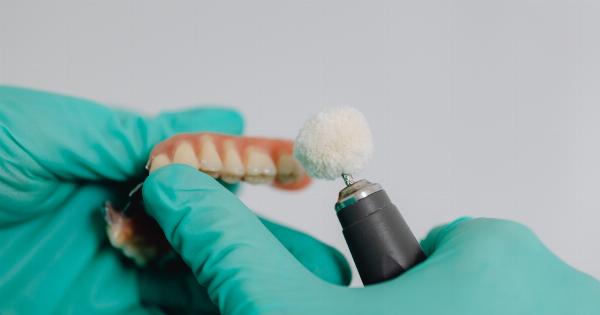Dental implants are metal posts or frames that are surgically positioned into the jawbone beneath the gums, which allows dentists to mount a replacement tooth onto it.
They are typically made of titanium and other materials compatible with the human body.
Why Choose Dental Implants?
Dental implants offer many benefits compared to other tooth replacement options, such as:.
- Improved Appearance: Dental implants look and feel like your natural teeth, and are available in a wide range of shapes and sizes to match your teeth.
- Improved Speech: Dental implants help improve speech as missing teeth cause the mouth to have a lisp or slurry speech. With dental implants lying firmly in the jawbone, an individual will no longer have to fear embarrassing slips while speaking, thereby boosting their confidence level.
- Better Comfort: Dental implants are comfortable, for there is no need to remove them at any time. Unlike dentures, which require the wearer to remove them before sleeping, dental implants are fixed and may remain permanently in the mouth.
- Easier Eating: Dental implants give the user better stability, and they can chew their food confidently and without any fear of misplacing their teeth.
- Durable: With proper care, oral implants can last up to thirty years or more. The replacement teeth are custom-made, strong, and robust, enabling them to become firm and last longer than other treatments.
- Improved Oral Health: Dental implants don’t rely on neighboring teeth for support, reducing the risk of damage to other teeth during installation.
- Convenience: They are more comfortable than traditional dentures, and there is no need for adhesives or any other uncomfortable solutions that one may have to wear with conventional treatment methods.
What Are The Different Types of Dental Implants?
There are two primary types of dental implants available today:.
Endosteal Implants
Endosteal implants are the most common type of implant used in modern dentistry. They involve surgically placing a titanium post into the jawbone and allowing it to osseointegrate with the bone before fitting the tooth crown.
This process can take up to six months to fully integrate, and several appointments may be required to ensure the implant fits perfectly.
Subperiosteal Implants
Subperiosteal implants are placed on or above the jawbone and are used on patients with shallow jawbone structure.
During treatment, a metal framework is placed below the gum, and as the gum heals, it becomes supported by the framework with posts extending above the gums to fit the tooth crown, just like the other implant procedure.
What Are The Benefits of Dental Implants?
Dental implants provide several benefits beyond their cosmetic appearance, which include:.
- Enhanced Speech: Missing teeth can cause slurred words or even whistling sounds when speaking. With dental implants, individuals can restore their ability to speak clearly as the implants look and function as natural teeth.
- Improved Comfort: Dentures can shift or harbor bacteria over time, making them uncomfortable to wear. Dental implants are permanent and stable and don’t require any repair.
- Better Dental Health: One reason for tooth loss is having an infected tooth treated with a root canal -the infection continues to grow, leading to tooth decay and extracted a permanent tooth. Dental implants provide a permanent solution that’s much safer than traditional root canals.
- Improved Facial Shape: Over time, bone loss can lead to facial changes, such as sagging and wrinkling. Dental implants consist of a screw-like post attached to the jawbone, preserving facial shape and preventing changes over time.
Who Needs Dental Implants?
Dental implants are a perfect solution for anyone who has:.
- A missing tooth or teeth
- A tooth that’s badly damaged or infected with root canal issues
- A tooth that’s unstable and in danger of falling out (due to gum disease)
- Difficulty eating, speaking, or even smiling due to tooth loss
- Bone loss caused by trauma or periodontitis
What’s Involved in The Dental Implant Procedure?
The dental implant process is a surgical procedure that typically involves several steps:.
- Dental Examination: During your first appointment, your dentist will conduct a thorough dental examination that includes X-rays and reviewing your medical history to ensure you’re a suitable candidate for the surgery.
- Tooth Extraction: If you have a decaying or damaged tooth that needs replacement, your dentist may need to remove it first.
- Jawbone Preparation: In some cases, jawbone preparation is required to support dental implants. This can involve bone grafting (using a piece of bone from another bone in your body) or a synthetic material to build up the jaw bone where the implant will be placed.
- Implant Placement: During the surgery, your dentist will create a small incision in your gum to expose your jaw bone, drill a hole to surgically place the metal implant, then stitch the incision back up. Over the months following the surgery, the bone will gradually fuse with the implant, creating a stable base for the crown.
- Abutment Placement: Once the implant is firmly in place, an abutment (small connector) will be attached to it, which sticks up above the gum line.
- Crown Placement: The final step of the experience involves placing the implant crown on top of the abutment, cementing it in place. This crown looks and feels like a natural tooth, making it an excellent long-term solution for tooth loss.
What Are The Risks of Dental Implants?
Like any surgical procedure, dental implant surgery carries some risks, which can include:.
- Damage to surrounding teeth, gums, or blood vessels
- Infection
- Nerve damage or numbness in the surrounding areas
- Mild pain or discomfort, particularly during the healing process. This typically subsides over time with over-the-counter painkillers and proper aftercare.
Dental Implant Aftercare
After your surgery, your dentist will provide you with detailed instructions on how to care for your dental implants, which can include:.
- Keeping the surgical area clean
- Prescribed antibiotics to prevent infection
- Using a saltwater rinse to help reduce swelling and promote healing
- Avoiding hard or crunchy foods that can damage the implant
Cost of Dental Implants
The cost of dental implants can vary depending on several factors, such as:.
- The type of implant being used
- The expertise of the dentist and location where the treatment is being done
- The additional procedures required, such as tooth extraction or bone grafting using a synthetic material or from the hip bone
- Dental insurance, which may not cover the cost of dental implants in full
Conclusion
Dental implants are a safe and effective solution for individuals suffering from tooth loss, providing an extensive list of benefits in comparison to other tooth replacement methods.
Consult your dentist to determine if you’re a suitable candidate for this safe and lifelong treatment option.























